Unit11 How was your school trip?Section A1a-2c&SectionB1a-1d课件2023-2024学年度人教版英语七年级下册
文档属性
| 名称 | Unit11 How was your school trip?Section A1a-2c&SectionB1a-1d课件2023-2024学年度人教版英语七年级下册 | 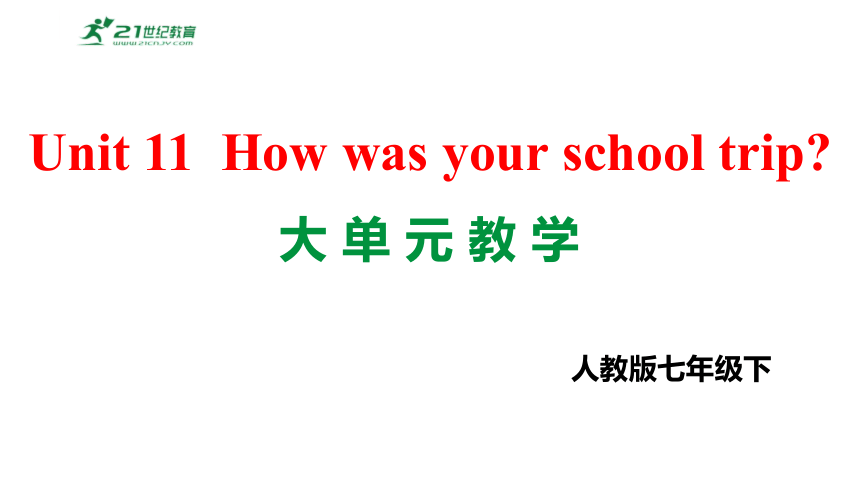 | |
| 格式 | pptx | ||
| 文件大小 | 52.6MB | ||
| 资源类型 | 试卷 | ||
| 版本资源 | 人教新目标(Go for it)版 | ||
| 科目 | 英语 | ||
| 更新时间 | 2024-04-26 15:10:35 | ||
图片预览

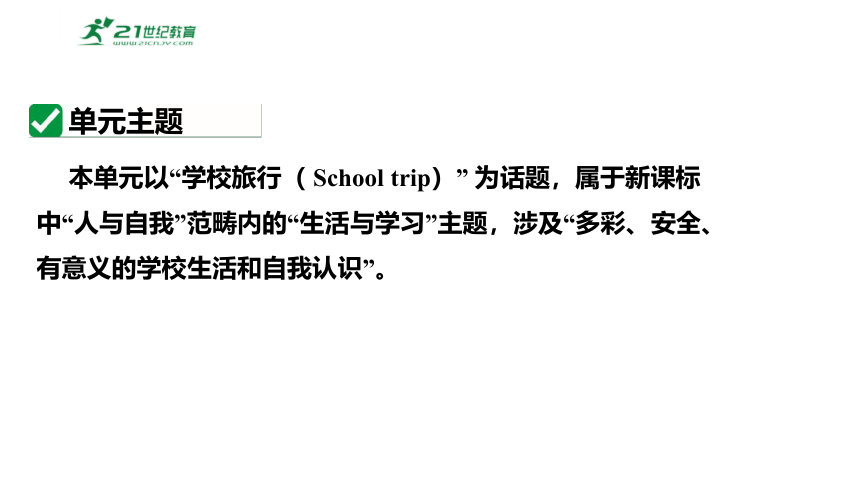

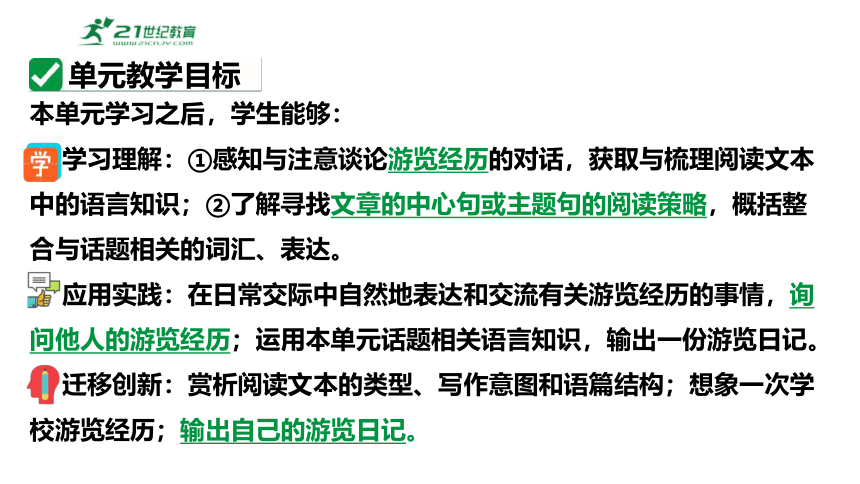
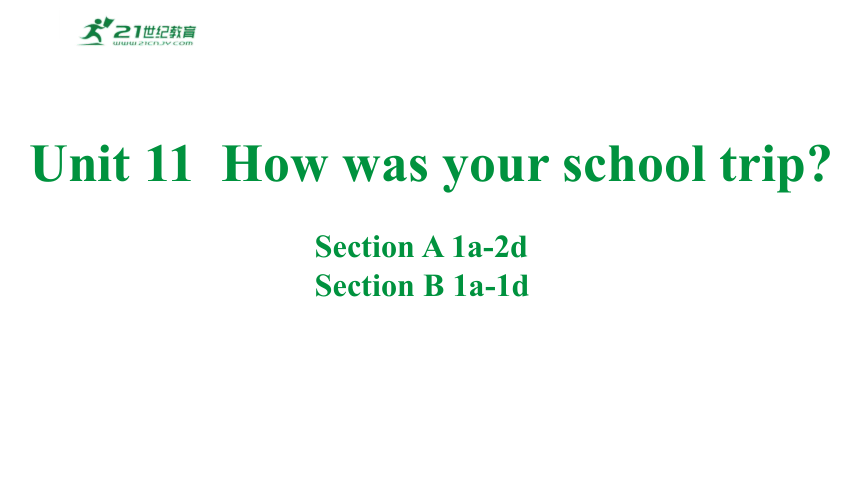
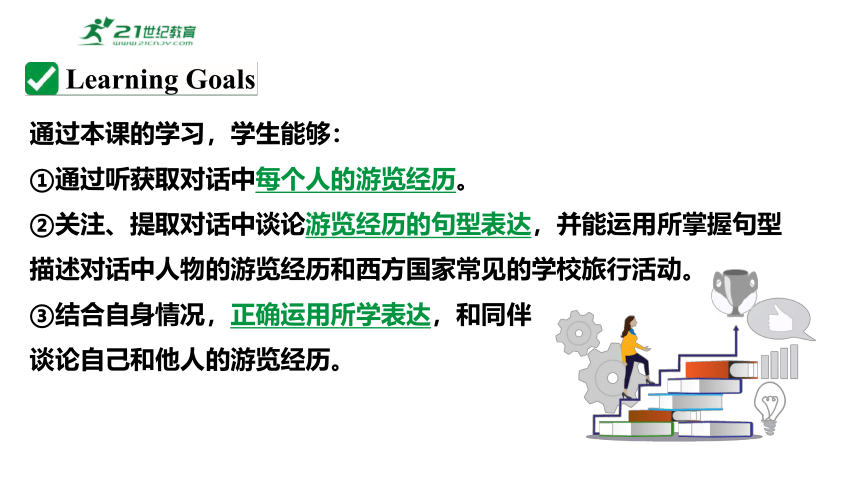
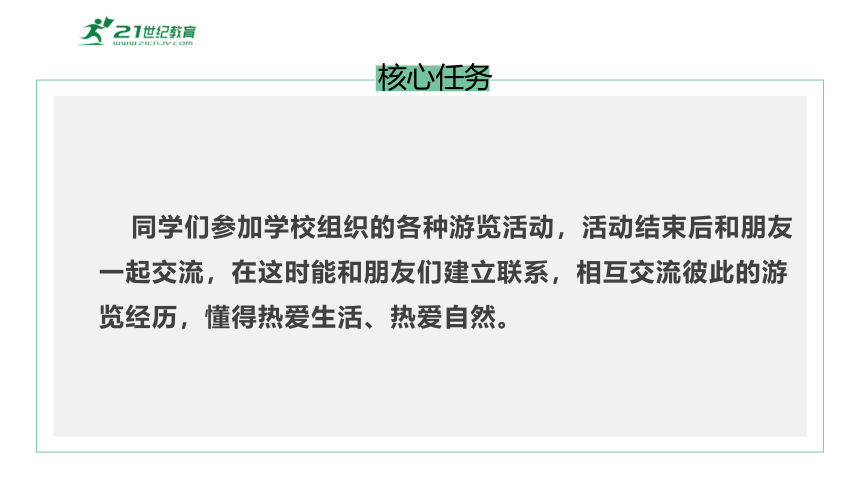
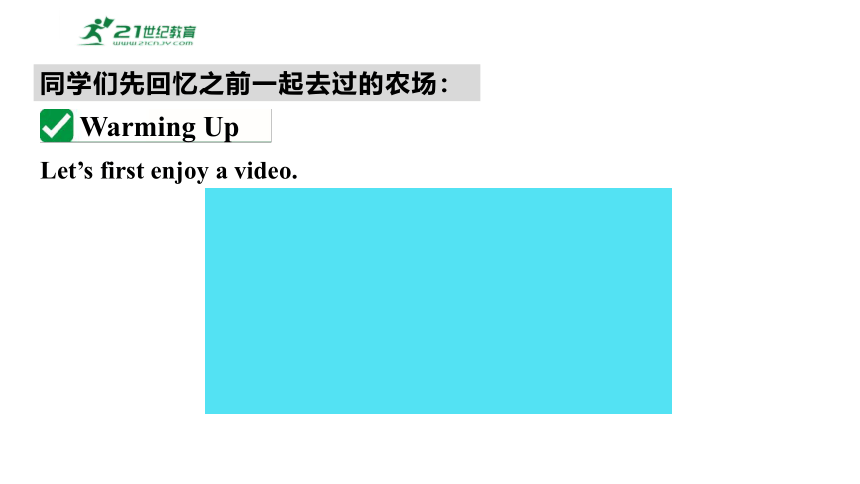
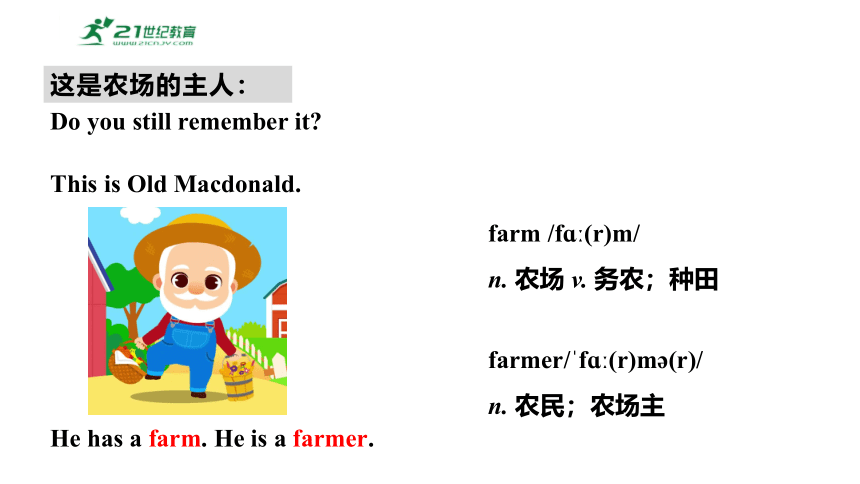
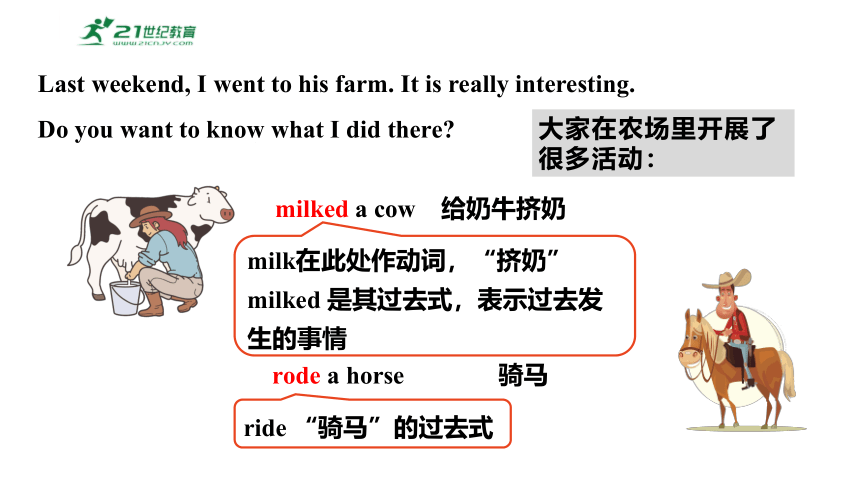

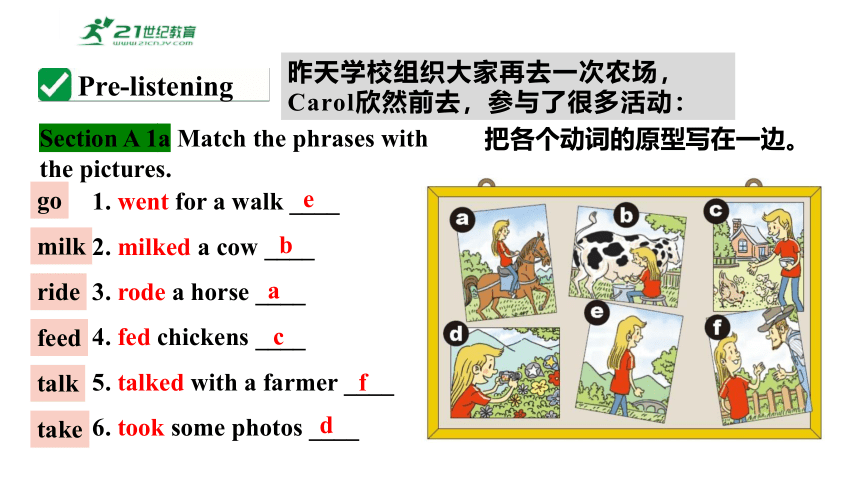
文档简介
(共45张PPT)
大 单 元 教 学
人教版七年级下
Unit 11 How was your school trip
单元主题
本单元以“学校旅行( School trip)” 为话题,属于新课标中“人与自我”范畴内的“生活与学习”主题,涉及“多彩、安全、有意义的学校生活和自我认识”。
单元主题内容导图
学校旅行
描述游览经历的信件
游览经历的日记
Section A 1a-2d
Section B 1a-1d
“School trips&Activies”
Section A Grammar
Section B Self Check
“Talking&Letters”
Section B 2a-3c
“Reading&Writing”
感受学校旅行
询问和叙述
过去的经历
描述学校旅行经历
学会客观看待事物
How was your school trip
学习感受学校旅行经历,能在口语交际中感知一般过去时的语用功能;询问和叙述过去的经历。
能在日记中描述自己曾经经历的过去的事情,引导学生懂得热爱校园生活,热爱自然,鼓励学生拥有多彩而富有意义的人生。
单元教学目标
本单元学习之后,学生能够:
学习理解:①感知与注意谈论游览经历的对话,获取与梳理阅读文本中的语言知识;②了解寻找文章的中心句或主题句的阅读策略,概括整合与话题相关的词汇、表达。
应用实践:在日常交际中自然地表达和交流有关游览经历的事情,询问他人的游览经历;运用本单元话题相关语言知识,输出一份游览日记。
迁移创新:赏析阅读文本的类型、写作意图和语篇结构;想象一次学校游览经历;输出自己的游览日记。
Unit 11 How was your school trip
Section A 1a-2d
Section B 1a-1d
通过本课的学习,学生能够:
①通过听获取对话中每个人的游览经历。
②关注、提取对话中谈论游览经历的句型表达,并能运用所掌握句型描述对话中人物的游览经历和西方国家常见的学校旅行活动。
③结合自身情况,正确运用所学表达,和同伴
谈论自己和他人的游览经历。
Learning Goals
同学们参加学校组织的各种游览活动,活动结束后和朋友一起交流,在这时能和朋友们建立联系,相互交流彼此的游览经历,懂得热爱生活、热爱自然。
核心任务
Let’s first enjoy a video.
Warming Up
同学们先回忆之前一起去过的农场:
Do you still remember it
This is Old Macdonald.
He has a farm. He is a farmer.
farm /fɑ (r)m/
n. 农场 v. 务农;种田
farmer/ fɑ (r)m (r)/
n. 农民;农场主
这是农场的主人:
Last weekend, I went to his farm. It is really interesting.
Do you want to know what I did there
milked a cow 给奶牛挤奶
rode a horse 骑马
milk在此处作动词,“挤奶”
milked 是其过去式,表示过去发生的事情
ride “骑马”的过去式
大家在农场里开展了很多活动:
fed chickens 喂鸡
went for a walk 散步
feed v.“喂养,饲养”的过去式
go v.“去”的过去式
Section A 1a Match the phrases with the pictures.
1. went for a walk ____
2. milked a cow ____
3. rode a horse ____
4. fed chickens ____
5. talked with a farmer ____
6. took some photos ____
e
b
a
c
f
d
把各个动词的原型写在一边。
go
milk
ride
feed
talk
take
Pre-listening
昨天学校组织大家再去一次农场,Carol欣然前去,参与了很多活动:
Listen to the tape for the first time and answer the question below.
Where did Carol go on a school trip
She went to a farm.
助动词do的过去式
回来后Carol和Bob交流游览的经历:
While-listening
Section A 1b Listen and circle the three things Carol did on her school trip in 1a.
1. went for a walk ____
2. milked a cow ____
3. rode a horse ____
4. fed chickens ____
5. talked with a farmer ____
6. took some photos ____
e
b
a
c
f
d
Let’s listen again. You can read after the tape.
Bob: Hi, Carol. How was your school trip yesterday
Carol: It was great!
Bob: Did you go to the zoo
Carol: No, I didn’t. I went to a farm. Look, here are my photos.
Bob: Did you see any cows
Carol: Yes, I did. I saw quite a lot.
Bob: Did you ride a horse
Carol: No, I didn’t. But I milked a cow.
Bob: Did you feed any chickens
Carol: Well, I saw some chickens but I didn’t feed them.
Bob: What else did you do
Carol: My friends and I went for a walk around the farm and talked with a farmer.
Section A 1c Ask and answer questions about Carol’s school trip.
Did Carol take any photos
Yes, she did.
No, she didn’t.
Did she feed any chickens
Did she...
...
注意用第三人称提问,然后做出相应的回答。
通过提问帮助Carol回忆昨天更多的游览细节:
你能根据这一情景结合前面所学的一般过去时的一般疑问句以及动词短语提一些问句吗?
1) Did she have a good time
2) Was she happy
3) What did she see
4) Did she ride a horse
Read the questions in 2a.
___ What did the farmer say __ Did you grow any apples
____What did you see ____ Do they grow apples
____ Did you learn anything ____ Did you eat them
____Did you ask him any questions ____Were they good
v. 种植
思考: 这两句话表达的内容有什么不同?
询问过去是否种过苹果
这句话问的是”农民们是否通常种苹果“,属于经常性的情况。
pron. (常用于否定句或疑问句)任何东西;任何事物
are的过去式
Bob和Carol继续交流农场游览的经历。
Section A 2a Listen and check (√) the questions you hear.
___ What did the farmer say __ Did you grow any apples
____What did you see ____ Do they grow apples
____ Did you learn anything ____ Did you eat them
____Did you ask him any questions ____Were they good
√
√
√
√
一位农民伯伯带Carol去看了他辛苦培育的农作物:
1. The farmer showed Carol around the farm.
2. Carol learned a lot about farming.
3. The farmers grow strawberries from December to June.
4. The farmers don’t grow apples.
5. Carol picked some strawberries and took them home.
Read the sentences in 2b.
show sb. around 带领某人四处参观
种草莓
from...to.. 从……到……
v. 采;摘
take sth. home 把……带回家
Section A 2b Listen again. Circle T for true or F for false.
1. The farmer showed Carol around the farm. T F
2. Carol learned a lot about farming. T F
3. The farmers grow strawberries from December to June. T F
4. The farmers don’t grow apples. T F
5. Carol picked some strawberries and took them home. T F
Let’s listen again. You can read after the tape.
Bob: So, Carol, was the farmer nice
Carol: Yes, he was very friendly, and he showed us around the farm.
Bob: Really What did you see
Carol: We saw a lot of interesting things and we learned a lot from him about farming.
Bob: That’s great! Did you ask him any questions
Carol: Yes. I asked him if the farmers grew strawberries.
Carol给Bob讲了参观作物过程中的见闻:
Bob: Do they
Carol: Yes, they do. They grow them from December to June.
Bob: And apples Do they grow apples
Carol: Yes, they do. They pick the apples around September.
Bob: Did you pick any strawberries
Carol: Yes, we did. And we took some home, too!
Bob: Oh, wow! Were they good
Carol: They were delicious!
Section A 2c Ask and answer questions about Carol’s visit to the farm.
What did Carol do
She picked some strawberries.
Yes, she did.
Did she ask any questions
Post-listening
通过提问继续帮助Carol回忆昨天更多的游览细节:
Look at the pictures below. What are they about
countryside
/ k ntrisa d/ n. 乡村;农村
clean
/kli n/ n. 干净的
1. What do you like about country life
2. How is the air in the countryside
除了农场,值得学校组织同学们去的地方还有美丽乡村,一起来欣赏吧!
1. Where did Eric go last weekend
2. Why did he go there
3. What did he do
4. How was the weather there
5. What did he do at night
6. How did Eric feel about the trip
Read the conversation in Section A 2d and answer the questions.
上周Eric就去过美丽乡村:
1. Where did Eric go last weekend
2. Why did he go there
3. What did he do
4. How was the weather there
5. What did he do at night
6. How did Eric feel about the trip
He went to the countryside.
Because he wanted to visit his grandparents.
He went fishing every day and he fed the chickens with his grandpa.
It was great, and the air was so clean.
He watched the stars at night.
It was excellent.
Listen and read after the tape.(注意语音语调和意群停顿)
Peter: Hi, Eric. How was your trip last week
Eric: It was excellent. I visited my grandparents in the countryside.
Peter: Oh, nice. What did you do
Eric: I went fishing every day. And I fed the chickens with my grandpa. It was so much fun.
Peter: Sounds good. How was the weather there
Eric: It was great, and the air was so clean. I watched the stars at night. They were so beautiful.
Peter: Lucky you.
adj. 极好的,优秀的
在乡下
非正式口语,相当于You’re so lucky.
不可数名词;有趣的事
Eric和Peter交流乡村之行:
英语国家学校的 school trips
若查词典,trip为“旅行;行程;旅游”之意。在汉语言文化背景下的我们看来,trip仅与户外游览相关,实则不然。英美等国的中小学校每学期都会组织大量的校外游览和体验等活动,他们把所有走出校外的活动统称为 school tips。这些校外活动或远或近,时而徒步,时而借助交通工具前往目的地,有些在室外,有些在室内。纵观这些活动,大致可
分为以下三类:
学校工作人员给大家总结展示了一些值得安排的旅程:
1)郊游观光
这种活动接近我国中小学校组织的“春游”或“秋游”,师生到郊外或景区、公园等地亲近自然、放松身心,调剂学校学习所带来的压力。
climb a mountain
go fishing
2)参观各类博物馆
英美等发达国家各个城市,无论大小,都有许多各类国立或地区性博物馆、科技馆、展览馆,且所有这些公立机构均实行免费参观制度,这就成为学校对学生进行各类文化和科学教育的好场所,因此学校会有计划地安排学生大量参加这样的“校外课堂”活动。
visit a museum
/mju zi m/
n. 博物馆
3)参加社会实践活动
组织学生参加社会实践活动也是中小学校校外活动的重头戏。这些活动包括访问养老院、参与公益或慈善机构的活动、参观大学或研究机构、参加街道宣传等。
visit a fire station
n. 消防站
Section B 1a Match the activities with the pictures.
1. go to the zoo ___ 4. climb a mountain ___
2. visit a museum ___ 5. visit a fire station ___
3. ride a horse ___ 6. go fishing ___
a
b
e
d
b
a
c
f
e
Pre-listening
爬山
参观消防站
去钓鱼
同学们了解到了很多新颖的校外活动:
Listen to the tape for the first time and answer the questions.
1. Where did Jane go on her school trip
2. Where did Tony go on his school trip
He went to an art museum.
She went to the countryside.
While-listening
Jane和Tony回忆起了自己曾经参加过的新颖学校游览活动:
1. How was Jane’s trip
2. How was Tony’s trip
Section B 1b Listen and answer the questions.
It was terrible.
It was great.
两位同学一起交流自己的游览故事和游览感受。
Section B 1c Listen again. What did Jane and Tony do on their last school trip Check (√) Tony or Jane.
went to the countryside climbed a mountain went to an art museum saw some paintings drew
pictures
Tony
Jane
√
√
√
√
√
n. 油画; 绘画
Listen again. Find out the description sentences(描述性语句).
Tony: How was your school trip, Jane
Jane: Oh, it was terrible.
Tony: Really Where did you go
Jane: Well, we went to the countryside and climbed a mountain. But the weather was so cold. It rained and rained all day long.
Tony: Oh, that’s too bad.
Jane: Ugh! How about your school trip, Tony
Tony: Well, it was raining here too, so we didn’t go to the countryside.
Jane: So what did you do then
Tony: We went to an art museum. It was great. There were so many interesting things to see. I saw some really beautiful paintings. Then we had lunch at the museum restaurant. The food was really delicious! After that, we went to a special art room and drew pictures. It was so much fun!
Jane: Sounds like you had a great school trip.
Tony: Yes. We had a really good time!
Section B 1d What was your last school trip like Discuss it with your partner.
I went to...
That sounds...
注意使用一般过去时态
Post-listening
同学们主动分享曾经的学校游览感受吧!
Key Phrases
给奶牛挤奶 _________________
骑马 _________________
喂鸡 _________________
散步 _________________
带领某人四处参观 _________________
种草莓 _________________
milked a cow
ride a horse
feed chickens
go for a walk
grow strawberries
show sb. around
从……到…… _________________
把……带回家 _________________
在乡下 _________________
爬山 _________________
参观消防站 _________________
去钓鱼 _________________
from...to..
take ... home
climb a mountain
visit a fire station
go fishing
in the countryside
A. What's on the farm
B. How was your trip
C. How did you get there
D. Did you help feed them
E. Do they have any animals
F. Where did you go last weekend
G. Sounds like you had fun last weekend.
补全对话,其中有两项多余。
Helen: Good morning, Tina.
Tina: Good morning, Helen. (1)_______
Helen: I went to the countryside with my parents.
Tina: Sounds good. (2)_______
Helen: It was great. We visited my grandparents. They live on a farm.
Tina: (3)_______
Helen: Yes. They have chickens and cows.
Tina: (4)_______
Helen: Yes. And I also learned a lot about farming.
Tina: Really (5)_______
Helen: Yes. Farm life is interesting.
F
B
E
D
G
Helen上周和父母去了农村,她和Tina交流自己的游览经历。
Exercises
1. Listening and speaking:
描述过去发生的事情
2. Word and Expressions:
feed, farmer, quite, anything, grow, farm, pick, excellent,
milk a cow, ride a horse, feed chickens, quite a lot (of...),
in the countryside,fire, museum, painting, fire station
Summary
Make conversations with your partner about Carol’s trip to farm.
Use as many expressions we learnt in this class as possible.
实践与拓展
大 单 元 教 学
人教版七年级下
Unit 11 How was your school trip
单元主题
本单元以“学校旅行( School trip)” 为话题,属于新课标中“人与自我”范畴内的“生活与学习”主题,涉及“多彩、安全、有意义的学校生活和自我认识”。
单元主题内容导图
学校旅行
描述游览经历的信件
游览经历的日记
Section A 1a-2d
Section B 1a-1d
“School trips&Activies”
Section A Grammar
Section B Self Check
“Talking&Letters”
Section B 2a-3c
“Reading&Writing”
感受学校旅行
询问和叙述
过去的经历
描述学校旅行经历
学会客观看待事物
How was your school trip
学习感受学校旅行经历,能在口语交际中感知一般过去时的语用功能;询问和叙述过去的经历。
能在日记中描述自己曾经经历的过去的事情,引导学生懂得热爱校园生活,热爱自然,鼓励学生拥有多彩而富有意义的人生。
单元教学目标
本单元学习之后,学生能够:
学习理解:①感知与注意谈论游览经历的对话,获取与梳理阅读文本中的语言知识;②了解寻找文章的中心句或主题句的阅读策略,概括整合与话题相关的词汇、表达。
应用实践:在日常交际中自然地表达和交流有关游览经历的事情,询问他人的游览经历;运用本单元话题相关语言知识,输出一份游览日记。
迁移创新:赏析阅读文本的类型、写作意图和语篇结构;想象一次学校游览经历;输出自己的游览日记。
Unit 11 How was your school trip
Section A 1a-2d
Section B 1a-1d
通过本课的学习,学生能够:
①通过听获取对话中每个人的游览经历。
②关注、提取对话中谈论游览经历的句型表达,并能运用所掌握句型描述对话中人物的游览经历和西方国家常见的学校旅行活动。
③结合自身情况,正确运用所学表达,和同伴
谈论自己和他人的游览经历。
Learning Goals
同学们参加学校组织的各种游览活动,活动结束后和朋友一起交流,在这时能和朋友们建立联系,相互交流彼此的游览经历,懂得热爱生活、热爱自然。
核心任务
Let’s first enjoy a video.
Warming Up
同学们先回忆之前一起去过的农场:
Do you still remember it
This is Old Macdonald.
He has a farm. He is a farmer.
farm /fɑ (r)m/
n. 农场 v. 务农;种田
farmer/ fɑ (r)m (r)/
n. 农民;农场主
这是农场的主人:
Last weekend, I went to his farm. It is really interesting.
Do you want to know what I did there
milked a cow 给奶牛挤奶
rode a horse 骑马
milk在此处作动词,“挤奶”
milked 是其过去式,表示过去发生的事情
ride “骑马”的过去式
大家在农场里开展了很多活动:
fed chickens 喂鸡
went for a walk 散步
feed v.“喂养,饲养”的过去式
go v.“去”的过去式
Section A 1a Match the phrases with the pictures.
1. went for a walk ____
2. milked a cow ____
3. rode a horse ____
4. fed chickens ____
5. talked with a farmer ____
6. took some photos ____
e
b
a
c
f
d
把各个动词的原型写在一边。
go
milk
ride
feed
talk
take
Pre-listening
昨天学校组织大家再去一次农场,Carol欣然前去,参与了很多活动:
Listen to the tape for the first time and answer the question below.
Where did Carol go on a school trip
She went to a farm.
助动词do的过去式
回来后Carol和Bob交流游览的经历:
While-listening
Section A 1b Listen and circle the three things Carol did on her school trip in 1a.
1. went for a walk ____
2. milked a cow ____
3. rode a horse ____
4. fed chickens ____
5. talked with a farmer ____
6. took some photos ____
e
b
a
c
f
d
Let’s listen again. You can read after the tape.
Bob: Hi, Carol. How was your school trip yesterday
Carol: It was great!
Bob: Did you go to the zoo
Carol: No, I didn’t. I went to a farm. Look, here are my photos.
Bob: Did you see any cows
Carol: Yes, I did. I saw quite a lot.
Bob: Did you ride a horse
Carol: No, I didn’t. But I milked a cow.
Bob: Did you feed any chickens
Carol: Well, I saw some chickens but I didn’t feed them.
Bob: What else did you do
Carol: My friends and I went for a walk around the farm and talked with a farmer.
Section A 1c Ask and answer questions about Carol’s school trip.
Did Carol take any photos
Yes, she did.
No, she didn’t.
Did she feed any chickens
Did she...
...
注意用第三人称提问,然后做出相应的回答。
通过提问帮助Carol回忆昨天更多的游览细节:
你能根据这一情景结合前面所学的一般过去时的一般疑问句以及动词短语提一些问句吗?
1) Did she have a good time
2) Was she happy
3) What did she see
4) Did she ride a horse
Read the questions in 2a.
___ What did the farmer say __ Did you grow any apples
____What did you see ____ Do they grow apples
____ Did you learn anything ____ Did you eat them
____Did you ask him any questions ____Were they good
v. 种植
思考: 这两句话表达的内容有什么不同?
询问过去是否种过苹果
这句话问的是”农民们是否通常种苹果“,属于经常性的情况。
pron. (常用于否定句或疑问句)任何东西;任何事物
are的过去式
Bob和Carol继续交流农场游览的经历。
Section A 2a Listen and check (√) the questions you hear.
___ What did the farmer say __ Did you grow any apples
____What did you see ____ Do they grow apples
____ Did you learn anything ____ Did you eat them
____Did you ask him any questions ____Were they good
√
√
√
√
一位农民伯伯带Carol去看了他辛苦培育的农作物:
1. The farmer showed Carol around the farm.
2. Carol learned a lot about farming.
3. The farmers grow strawberries from December to June.
4. The farmers don’t grow apples.
5. Carol picked some strawberries and took them home.
Read the sentences in 2b.
show sb. around 带领某人四处参观
种草莓
from...to.. 从……到……
v. 采;摘
take sth. home 把……带回家
Section A 2b Listen again. Circle T for true or F for false.
1. The farmer showed Carol around the farm. T F
2. Carol learned a lot about farming. T F
3. The farmers grow strawberries from December to June. T F
4. The farmers don’t grow apples. T F
5. Carol picked some strawberries and took them home. T F
Let’s listen again. You can read after the tape.
Bob: So, Carol, was the farmer nice
Carol: Yes, he was very friendly, and he showed us around the farm.
Bob: Really What did you see
Carol: We saw a lot of interesting things and we learned a lot from him about farming.
Bob: That’s great! Did you ask him any questions
Carol: Yes. I asked him if the farmers grew strawberries.
Carol给Bob讲了参观作物过程中的见闻:
Bob: Do they
Carol: Yes, they do. They grow them from December to June.
Bob: And apples Do they grow apples
Carol: Yes, they do. They pick the apples around September.
Bob: Did you pick any strawberries
Carol: Yes, we did. And we took some home, too!
Bob: Oh, wow! Were they good
Carol: They were delicious!
Section A 2c Ask and answer questions about Carol’s visit to the farm.
What did Carol do
She picked some strawberries.
Yes, she did.
Did she ask any questions
Post-listening
通过提问继续帮助Carol回忆昨天更多的游览细节:
Look at the pictures below. What are they about
countryside
/ k ntrisa d/ n. 乡村;农村
clean
/kli n/ n. 干净的
1. What do you like about country life
2. How is the air in the countryside
除了农场,值得学校组织同学们去的地方还有美丽乡村,一起来欣赏吧!
1. Where did Eric go last weekend
2. Why did he go there
3. What did he do
4. How was the weather there
5. What did he do at night
6. How did Eric feel about the trip
Read the conversation in Section A 2d and answer the questions.
上周Eric就去过美丽乡村:
1. Where did Eric go last weekend
2. Why did he go there
3. What did he do
4. How was the weather there
5. What did he do at night
6. How did Eric feel about the trip
He went to the countryside.
Because he wanted to visit his grandparents.
He went fishing every day and he fed the chickens with his grandpa.
It was great, and the air was so clean.
He watched the stars at night.
It was excellent.
Listen and read after the tape.(注意语音语调和意群停顿)
Peter: Hi, Eric. How was your trip last week
Eric: It was excellent. I visited my grandparents in the countryside.
Peter: Oh, nice. What did you do
Eric: I went fishing every day. And I fed the chickens with my grandpa. It was so much fun.
Peter: Sounds good. How was the weather there
Eric: It was great, and the air was so clean. I watched the stars at night. They were so beautiful.
Peter: Lucky you.
adj. 极好的,优秀的
在乡下
非正式口语,相当于You’re so lucky.
不可数名词;有趣的事
Eric和Peter交流乡村之行:
英语国家学校的 school trips
若查词典,trip为“旅行;行程;旅游”之意。在汉语言文化背景下的我们看来,trip仅与户外游览相关,实则不然。英美等国的中小学校每学期都会组织大量的校外游览和体验等活动,他们把所有走出校外的活动统称为 school tips。这些校外活动或远或近,时而徒步,时而借助交通工具前往目的地,有些在室外,有些在室内。纵观这些活动,大致可
分为以下三类:
学校工作人员给大家总结展示了一些值得安排的旅程:
1)郊游观光
这种活动接近我国中小学校组织的“春游”或“秋游”,师生到郊外或景区、公园等地亲近自然、放松身心,调剂学校学习所带来的压力。
climb a mountain
go fishing
2)参观各类博物馆
英美等发达国家各个城市,无论大小,都有许多各类国立或地区性博物馆、科技馆、展览馆,且所有这些公立机构均实行免费参观制度,这就成为学校对学生进行各类文化和科学教育的好场所,因此学校会有计划地安排学生大量参加这样的“校外课堂”活动。
visit a museum
/mju zi m/
n. 博物馆
3)参加社会实践活动
组织学生参加社会实践活动也是中小学校校外活动的重头戏。这些活动包括访问养老院、参与公益或慈善机构的活动、参观大学或研究机构、参加街道宣传等。
visit a fire station
n. 消防站
Section B 1a Match the activities with the pictures.
1. go to the zoo ___ 4. climb a mountain ___
2. visit a museum ___ 5. visit a fire station ___
3. ride a horse ___ 6. go fishing ___
a
b
e
d
b
a
c
f
e
Pre-listening
爬山
参观消防站
去钓鱼
同学们了解到了很多新颖的校外活动:
Listen to the tape for the first time and answer the questions.
1. Where did Jane go on her school trip
2. Where did Tony go on his school trip
He went to an art museum.
She went to the countryside.
While-listening
Jane和Tony回忆起了自己曾经参加过的新颖学校游览活动:
1. How was Jane’s trip
2. How was Tony’s trip
Section B 1b Listen and answer the questions.
It was terrible.
It was great.
两位同学一起交流自己的游览故事和游览感受。
Section B 1c Listen again. What did Jane and Tony do on their last school trip Check (√) Tony or Jane.
went to the countryside climbed a mountain went to an art museum saw some paintings drew
pictures
Tony
Jane
√
√
√
√
√
n. 油画; 绘画
Listen again. Find out the description sentences(描述性语句).
Tony: How was your school trip, Jane
Jane: Oh, it was terrible.
Tony: Really Where did you go
Jane: Well, we went to the countryside and climbed a mountain. But the weather was so cold. It rained and rained all day long.
Tony: Oh, that’s too bad.
Jane: Ugh! How about your school trip, Tony
Tony: Well, it was raining here too, so we didn’t go to the countryside.
Jane: So what did you do then
Tony: We went to an art museum. It was great. There were so many interesting things to see. I saw some really beautiful paintings. Then we had lunch at the museum restaurant. The food was really delicious! After that, we went to a special art room and drew pictures. It was so much fun!
Jane: Sounds like you had a great school trip.
Tony: Yes. We had a really good time!
Section B 1d What was your last school trip like Discuss it with your partner.
I went to...
That sounds...
注意使用一般过去时态
Post-listening
同学们主动分享曾经的学校游览感受吧!
Key Phrases
给奶牛挤奶 _________________
骑马 _________________
喂鸡 _________________
散步 _________________
带领某人四处参观 _________________
种草莓 _________________
milked a cow
ride a horse
feed chickens
go for a walk
grow strawberries
show sb. around
从……到…… _________________
把……带回家 _________________
在乡下 _________________
爬山 _________________
参观消防站 _________________
去钓鱼 _________________
from...to..
take ... home
climb a mountain
visit a fire station
go fishing
in the countryside
A. What's on the farm
B. How was your trip
C. How did you get there
D. Did you help feed them
E. Do they have any animals
F. Where did you go last weekend
G. Sounds like you had fun last weekend.
补全对话,其中有两项多余。
Helen: Good morning, Tina.
Tina: Good morning, Helen. (1)_______
Helen: I went to the countryside with my parents.
Tina: Sounds good. (2)_______
Helen: It was great. We visited my grandparents. They live on a farm.
Tina: (3)_______
Helen: Yes. They have chickens and cows.
Tina: (4)_______
Helen: Yes. And I also learned a lot about farming.
Tina: Really (5)_______
Helen: Yes. Farm life is interesting.
F
B
E
D
G
Helen上周和父母去了农村,她和Tina交流自己的游览经历。
Exercises
1. Listening and speaking:
描述过去发生的事情
2. Word and Expressions:
feed, farmer, quite, anything, grow, farm, pick, excellent,
milk a cow, ride a horse, feed chickens, quite a lot (of...),
in the countryside,fire, museum, painting, fire station
Summary
Make conversations with your partner about Carol’s trip to farm.
Use as many expressions we learnt in this class as possible.
实践与拓展
同课章节目录
- Unit 1 Can you play the guitar?
- Section A
- Section B
- Unit 2 What time do you go to school?
- Section A
- Section B
- Unit 3 How do you get to school?
- Section A
- Section B
- Unit 4 Don't eat in class.
- Section A
- Section B
- Unit 5 Why do you like pandas?
- Section A
- Section B
- Unit 6 I'm watching TV.
- Section A
- Section B
- Review of Units 1-6
- Unit 7 It's raining!
- Section A
- Section B
- Unit 8 Is there a post office near here?
- Section A
- Section B
- Unit 9 What does he look like?
- Section A
- Section B
- Unit 10 I'd like some noodles.
- Section A
- Section B
- Unit 11 How was your school trip?
- Section A
- Section B
- Unit 12 What did you do last weekend?
- Section A
- Section B
